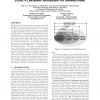Free Online Productivity Tools
i2Speak
i2Symbol
i2OCR
iTex2Img
iWeb2Print
iWeb2Shot
i2Type
iPdf2Split
iPdf2Merge
i2Bopomofo
i2Arabic
i2Style
i2Image
i2PDF
iLatex2Rtf
Sci2ools
ISCA
2006
IEEE
2006
IEEE
SODA: A Low-power Architecture For Software Radio
The physical layer of most wireless protocols is traditionally implemented in custom hardware to satisfy the heavy computational requirements while keeping power consumption to a minimum. These implementations are time consuming to design and difficult to verify. A programmable hardware platform capable of supporting software implementations of the physical layer, or software defined radio, has a number of advantages. These include support for multiple protocols, faster time-to-market, higher chip volumes, and support for late implementation changes. The challenge is to achieve this without sacrificing power. In this paper, we present a design study for a fully programmable architecture, SODA, that supports software defined radio — a high-end signal processing application. Our design achieves high performance, energy efficiency, and programmability through a combination of features that include single-instruction multiple-data (SIMD) parallelism, and hardware optimized for 16bit ...
| Added | 12 Jun 2010 |
| Updated | 12 Jun 2010 |
| Type | Conference |
| Year | 2006 |
| Where | ISCA |
| Authors | Yuan Lin, Hyunseok Lee, Mark Woh, Yoav Harel, Scott A. Mahlke, Trevor N. Mudge, Chaitali Chakrabarti, Krisztián Flautner |
Comments (0)

